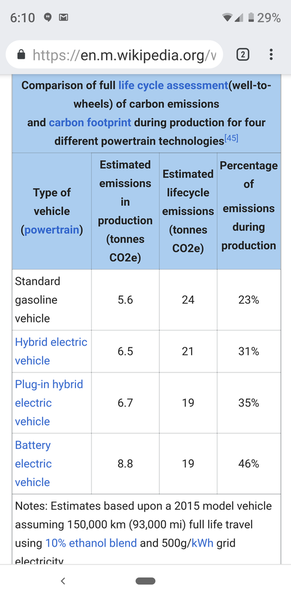As an old research scientist, I like the motto of the Oregon Research Institute: " In Data We Trust." Well conducted studies peer reviewed by experts in the field can lend weight arguments. In science, there is no "proof" but when the preponderance of reliable data supports an idea, it is usually the best we can use at that time.
I was taught that I better have data to support my arguments. For example, here's a chart from a study by Ricardo (2011) showing that indeed, EV production has a higher environmental impact than ICs. But, it also shows that over the lifetime of the car, EVs have a lower environmental impact than IC cars.

These results are replicated in findings from studies in Sweden, a study by the Automotive Science Group that followed 1300 US cars through their lives and other studies. The links to the original studies are available at: https://en.m.wikipedia.org/wik..._of_the_electric_car
If any of my university librarian colleagues discover this post, please forgive me for citing Wikipedia, but it's really not a bad article and the sources are reasonable!!!
Also, I m sorry to whine but it puts my teeth on edge when statements are made saying that IC owners are paying for EV owners to do blah blah blah.
That kind of argument creates an emotional dichotomy that is false. Money is spent from budgets. You can argue that anything that is funded takes money from something that isn't funded. For example, a fallacious dichotomy might be "Vietnam vets aren't getting the health care and respect that they deserve because we're spending federal funds on fly-byes by fighter jets at sporting events."
Ridiculous, huh. We have the budgets we have because our representatives and executive leaders choose it. Not because the guy 4 parking spaces down bought an electric Intermeccanica. If you don't like the budget, use the Constitution to vote in some different rascals.
This finger pointing to justify what you don't like feels like a dishonest approach to convincing people that your idea has merit. Show me the data, and the link to the study so I can evaluate the quality of the science.
So, I just put down my 15 year old Belgian Malinois. She was one the most serious and loyal dogs I've ever encountered. A true force with which to be reckoned (Seal Team 6 took a Belgian with them to get Bin Laden). I miss her terribly and it probably made me be a little bit more cranky than usual. For that I apologize.
Stan, I think I probably need to offer my resignation for being "the man" today. Time for me to sign off.
![]()




